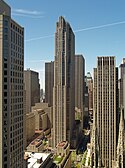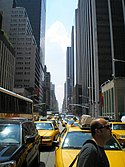Midtown Manhattan | |
|---|---|
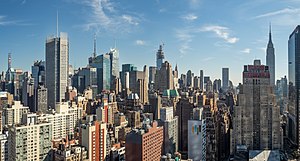 Midtown Manhattan, the world's largest central business district, October 2019 | |
 Location of Midtown Manhattan in New York City | |
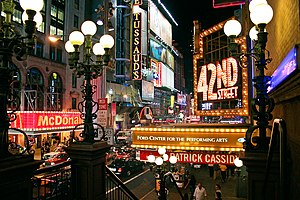 42nd Street in the Broadway Theatre District of Midtown Manhattan | |
| Coordinates: 40°45′17″N 73°59′3″W / 40.75472°N 73.98417°W[1] | |
| Country | |
| State | New York |
| City | New York City |
| Borough | Manhattan |
| Community District | Manhattan 5[2] |
| Area | |
| • Total | 5.84 km2 (2.254 sq mi) |
| Population (2010) | |
| • Total | 104,753 |
| • Density | 18,000/km2 (46,000/sq mi) |
| Ethnicity | |
| • White | 64.1 |
| • Asian | 20.8 |
| • Hispanic | 8.1 |
| • Black | 4.6 |
| • Others | 2.4 |
| Economics | |
| • Median income | $120,854 |
| Time zone | UTC−05:00 (Eastern) |
| • Summer (DST) | UTC−04:00 (EDT) |
| ZIP Codes | 10001, 10016–10019, 10022, 10036, several smaller ZIP Codes |
| Area code | 212, 332, 646, and 917 |
Midtown Manhattan is the central portion of the New York City borough of Manhattan, and serves as the city's primary central business district. Midtown is home to some of the city's most prominent buildings, including the Empire State Building, the Chrysler Building, the Hudson Yards Redevelopment Project, the headquarters of the United Nations, Grand Central Terminal, and Rockefeller Center, as well as several prominent tourist destinations, including Broadway, Times Square, and Koreatown. Penn Station in Midtown Manhattan is the busiest transportation hub in the Western Hemisphere.[4]
Midtown Manhattan is the largest central business district in the world, and has been ranked as the densest central business district in the world in terms of employees, at 606,108 per square mile (234,020/km2).[5] Midtown also ranks among the world's most expensive locations for real estate; Fifth Avenue in Midtown Manhattan has commanded the world's highest retail rents and is the most expensive shopping street in the world.[6] Midtown Manhattan is the country's largest commercial, entertainment, and media center, and is also a growing financial and fintech center.[7]
Many of New York City's skyscrapers, including its tallest hotels and apartment towers, are located in Midtown Manhattan. The neighborhood hosts commuters and residents working in its offices, hotels, and retail establishments, tourists and students. Times Square, the brightly illuminated hub of the Broadway Theater District,[8][9][10][11][12] is a major center of the world's entertainment industry.[13] Sixth Avenue also has the headquarters of three of the four major U.S. television networks.
Midtown is part of Manhattan Community District 5.[2] It is patrolled by the 14th and 18th precincts of the New York City Police Department.
Location
[edit]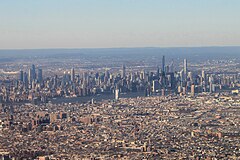
Geographically, the northern boundary of Midtown Manhattan is commonly defined to be 59th Street; its southern boundary is less clear, and variously taken to be 34th Street, 23rd Street, or even 14th Street.[according to whom?] Midtown spans the entire island of Manhattan along an east–west axis, bounded by the East River on its east and the Hudson River to its west. [according to whom?] The Encyclopedia of New York City defines Midtown as extending from 34th Street to 59th Street and from 3rd Avenue to 8th Avenue.[14]
Neighborhoods
[edit]
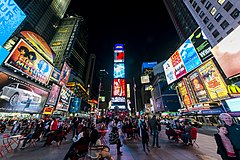

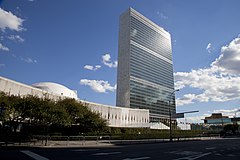
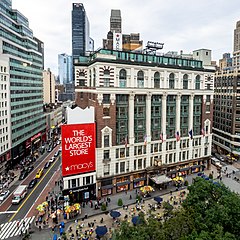
In addition to its central business district, Midtown Manhattan encompasses many neighborhoods, including Hell's Kitchen and Chelsea on the West Side, and Murray Hill, Kips Bay, Turtle Bay, and Gramercy Park on the East Side. It is sometimes broken into "Midtown East" and "Midtown West", or north and south as in the New York City Police Department's Midtown North and Midtown South precincts.
Neighborhoods in the Midtown area include the following:
- Between 59th Street to the north and 42nd Street to the south, from west to east:
- Hell's Kitchen from the Hudson River to 8th Avenue, including
- Theatre Row on West 42nd Street between 11th Avenue and 9th Avenue,
- where Hell's Kitchen meets Central Park and the Upper West Side at West 59th Street and 8th Avenue, Columbus Circle
- Times Square and the Theater District from West 42nd Street to around West 53rd Street (according to some until Central Park at Central Park South/59th Street), and from Eighth Avenue to 6th Avenue
- The Diamond District on West 47th Street between 6th Avenue and 5th Avenue
- Midtown East from around 6th Avenue to the East River, including (going from west to east, and north to south):
- Sutton Place near the East River between East 53rd Street and East 59th Street
- Turtle Bay from 53rd Street to 42nd Street and from Lexington Avenue to the East River
- Tudor City from 1st Avenue to 2nd Avenue and East 40th Street to East 43rd Street
- Hell's Kitchen from the Hudson River to 8th Avenue, including
- Between 42nd Street north and around 34th Street, from west to east, and north to south:
- Hell's Kitchen from the Hudson River to 8th Avenue
- The Garment District from West 42nd Street to West 34th Street and from 9th Avenue to 5th Avenue
- Herald Square around the intersection of Broadway, Sixth Avenue, and West 34th Street
- Murray Hill from East 42nd Street to East 34th Street and Fifth Avenue to Second Avenue
- Between 34th Street and 23rd Street, from west to east:
- Chelsea, between the Hudson River and Sixth Avenue
- Koreatown from 36th Street to 31st Street and 5th and 6th Avenues centered on "Korea Way" on 32nd Street between 5th Avenue and Broadway
- Rose Hill or Curry Hill between Madison Avenue and 3rd Avenue
- Kips Bay from 3rd Avenue to the East River
- Between 23rd Street and 14th Street, going west to east and north to south:
- Chelsea, between the Hudson River and 6th Avenue
- The Meatpacking District in the southwesternmost corner of Midtown, to the south of West 15th Street
- Madison Square and the Flatiron District, the area surrounding the intersection of Broadway, 5th Avenue, and 23rd Street.
- Union Square, to the northeast of the intersection of Broadway, East 14th Street, and Park Avenue South
- Gramercy from East 23rd Street to East 14th Street and Lexington Avenue to 1st Avenue
- Peter Cooper Village from East 23rd Street to East 20th Street and 1st Avenue to Avenue C (parallel the East River)
- Stuyvesant Town from East 20th Street to East 14th Street and 1st Avenue to Avenue C
Midtown is the original district in the United States to bear the name and included historical but now defunct neighborhoods such as the Ladies' Mile, along Fifth Avenue from 14th to 23rd Street; and the Tenderloin, from 23rd to 42nd Street and from Fifth Avenue to Seventh Avenue.
Landmarks
[edit]- Empire State Building
- Museum of Modern Art
- St. Patrick's Cathedral
- Grand Central Terminal
- New York Public Library
- Chrysler Building
- Deutsche Bank Center
- Bank of America Tower
- United Nations Headquarters
- Carnegie Hall
- Madison Square Garden
- Manhattan Center
- James Farley Post Office
- Pennsylvania Station
- Trump Tower
- Plaza Hotel
- Waldorf-Astoria Hotel
- Bryant Park
- Times Square
- Flagship stores:
- Prominent gentlemen's clubs:
Avenues
[edit]Important streets and thoroughfares
Differing demarcations
[edit]The border of Midtown Manhattan is nebulous and further confused by the fact that the term "Midtown Manhattan" can be used to refer either to a district or a group of neighborhoods and districts in Manhattan:
- The area between 14th and 86th Streets includes roughly the center of Manhattan; however, the term Midtown Manhattan can also apply to the area between 31st Street and 59th Streets, although there are still office buildings south of 31st Street.
- Manhattan Community District 5 is located from 14th to 59th Streets, generally between Lexington Avenue and Eighth Avenue. Community District 5 is largely coterminous with Midtown but also includes the Flatiron District, NoMad, Union Square, and parts of Gramercy Park and Rose Hill.[2]
- Midtown proper (within the boundaries of Manhattan Community District 5, and excluding overlapping neighborhoods) is located from 34th to 59th Streets between Third Avenue and Eighth Avenue.[14]
- The "Plaza District", a term used by Manhattan real estate professionals to denote the most expensive area of midtown from a commercial real estate perspective, lies between 42nd Street and 59th Street, from 3rd Avenue to 7th Avenue, about a square kilometer or half a square mile.
- "Midtown South" can refer to the part of Midtown between 23rd Street and around 42nd Street (although its northern boundary is defined differently depending on the source).
- "Midtown West" can refer to the area between 34th and 59th Streets, and between 5th and 12th Avenues.
- "Midtown East" can refer to the area between 42nd and 59th Streets, and between 5th Avenue and the East River.
- In 1982, the City of New York identified the "Manhattan Core" as the area that includes some of the city's most populous neighborhoods, major institutions, parks and transit hubs, and the city's primary Central Business District (CBD), defined as Manhattan below 60th Street.[15] The "Manhattan Core" includes some areas slightly further north of 86th Street in Manhattan, as well as the area below 14th Street; however, this definition is problematic because it ignores the fact that Manhattan has not one but two zones in which people do business within this area separated by a wide swath of low-rise (by New York City standards) residential development — there is Midtown (which is in Midtown Manhattan), and the Financial District, (also known simply as "Downtown" because of its location in southern Manhattan). In other sources, these districts are referred to as separate central business districts.[16]
Cityscape
[edit]Economy
[edit]Midtown Manhattan, along with Lower Manhattan, is one of the world's leading financial centers.
Corporate headquarters
[edit]Midtown Manhattan is the one of the world's largest central business district, with 400 million square feet (37.2 million m2) of office space in 2018.[17] Midtown contains the headquarters of major companies, including 4Kids Entertainment (formerly),[18] Barnes & Noble,[19] Bloomberg L.P.,[20] Ernst & Young,[21] Calvin Klein,[22] Cantor Fitzgerald,[23] CBS Corporation,[24] Citigroup,[25] Colgate-Palmolive,[26] Cushman & Wakefield,[27] DC Comics,[28] Deloitte,[29] Duane Reade,[30] Estée Lauder Companies,[31] Foot Locker,[32] Frederator Studios,[33] JPMorgan Chase,[34] Hess Corporation,[35] Kroll Inc.,[36] L-3 Communications,[37] Marsh & McLennan Companies,[38] Marvel Entertainment,[39] MetLife,[40] MidOcean Partners,[41] Morgan Stanley,[42] Nasdaq, Inc.,[43] NBCUniversal,[44] The New York Times Company,[45] NexCen Brands,[46] Paramount Global,[47] Pfizer,[48] Polo Ralph Lauren,[49] Saks Incorporated (Saks Fifth Avenue),[50] The Sharper Image,[51] Simon & Schuster,[24] Six Flags,[52] TBWA Worldwide,[53] Thomson Reuters,[54] Warner Bros. Discovery,[55] Time Warner Cable,[56] The Travelers Companies, and Univision Communications.[57] The New York Institute of Finance is located in Midtown Manhattan.[58]
Foreign subsidiary operations
[edit]Haier operates its United States offices in the Haier Building at 1356 Broadway, formerly the headquarters of the Greenwich Savings Bank. Haier held the opening ceremony on March 4, 2002.[59] Sumitomo Corporation operates its New York Office, the headquarters of the corporation's United States operations, at 600 Third Avenue, 10016 in the Murray Hill neighborhood.[60] El Al's North American headquarters are in Midtown.[61] The Air France USA regional headquarters are in 125 West 55th Street in Midtown Manhattan.[62][63] Hachette Book Group USA has its headquarters in 237 Park Avenue.[64] In 1994 Alitalia considered moving its USA headquarters from Midtown to Lower Manhattan, but decided to keep the offices where they were at the last minute.[65] Global Infrastructure Partners has an office in Midtown Manhattan.[66]
Tech and biotech
[edit]Silicon Alley, the common metonym for New York City's high tech sector, is based in Midtown South, specifically the Flatiron District. Prominent Silicon Alley companies in Midtown include AppNexus, Blue Apron, Gilt, Betterment, Oscar, SoFi, Rent the Runway, Warby Parker, and WeWork. The technology sector has been expanding across Midtown Manhattan since 2010.[67] The biotechnology sector is also growing in Midtown Manhattan based upon the city's strength in academic scientific research and public and commercial financial support. By mid-2014, Accelerator, a biotech investment firm, had raised more than US$30 million from investors, including Eli Lilly and Company, Pfizer, and Johnson & Johnson, for initial funding to create biotechnology startups at the Alexandria Center for Life Science, which encompasses more than 700,000 square feet (65,000 m2) on East 29th Street and promotes collaboration among scientists and entrepreneurs at the center and with nearby academic, medical, and research institutions. The New York City Economic Development Corporation's Early Stage Life Sciences Funding Initiative and venture capital partners, including Celgene, General Electric Ventures, and Eli Lilly, committed a minimum of US$100 million to help launch 15 to 20 ventures in life sciences and biotechnology.[68]
Real estate
[edit]
Real estate is a major force in Midtown Manhattan's economy, and indeed the city's, as the total value of all New York City property was estimated at US$914.8 billion for the 2015 fiscal year.[69] Manhattan has perennially been home to some of the nation's, as well as one of the world's, most marketable real estate, including the Time Warner Center, which had the highest-listed market value in the city in 2006 at US$1.1 billion,[70] to be subsequently surpassed in October 2014 by the Waldorf Astoria New York, which became the most expensive hotel ever sold after being purchased by the Anbang Insurance Group, based in China, for US$1.95 billion.[71] In the same year, six of the top ten most expensive zip codes in the United States by median housing price were located in Manhattan, underscoring the borough's dominant position in the real estate market.[72] When 450 Park Avenue was sold on July 2, 2007, for US$510 million, about US$1,589 per square foot (US$17,104/m2), it broke the barely month-old record for an American office building of US$1,476 per square foot (US$15,887/m2) based on the sale of 660 Madison Avenue.[73] In 2014, Manhattan was home to six of the top ten zip codes in the United States by median housing price.[74] In 2019, the most expensive home sale ever in the United States achieved completion in Midtown Manhattan, at a selling price of US$238 million, for a 24,000 square feet (2,200 m2) penthouse apartment overlooking Central Park at 220 Central Park South.[75]
The COVID-19 pandemic and hybrid work models have prompted consideration of commercial-to-residential conversion within the neighborhood's real estate sector.[76] In August 2023, Mayor Eric Adams announced a program aimed at creating "a 24/7, live-work, mixed-use neighborhood" in Midtown South though the conversion of commercial and office space to residential, as part of an effort to create 20,000 new residences citywide in a decade.[77][78]
Broadway theatre
[edit]According to The Broadway League, shows on Broadway sold approximately US$1.54 billion worth of tickets in both the 2022–2023 and 2023–2024 seasons. Both seasons featured theater attendance of approximately 12.3 million each.[79]
Former economic operations
[edit]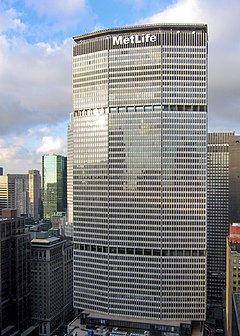
Companies that used to have their headquarters in Midtown Manhattan include American Airlines,[80][81] American Comics Group,[82] American Overseas Airlines,[83] Central Park Media,[84][85] Eastern Air Lines,[86] GoodTimes Entertainment,[87] LJN,[88] NewKidCo,[89] Pan American World Airways,[90] Philip Morris Companies (now Altria Group),[91][92] Trans Caribbean Airways,[93] and Trans World Airlines.[94][95][96] In 1997, Aer Lingus announced that it was moving its North American headquarters from Midtown to Melville, New York, in Suffolk County on Long Island.[97]
Demographics
[edit]Based on data from the 2010 United States Census, the population of Midtown Manhattan was 28,630, a change of 2,823 (9.9%) from the 25,807 counted in 2000. Covering an area of 692.81 acres (280.37 ha), the neighborhood had a population density of 41.3 inhabitants per acre (26,400/sq mi; 10,200/km2).[98] The racial makeup of the neighborhood was 64.1% (18,351) White, 4.6% (1,310) African American, 0.1% (34) Native American, 20.8% (5,942) Asian, 0% (8) Pacific Islander, 0.3% (92) from other races, and 2% (569) from two or more races. Hispanic or Latino residents of any race were 8.1% (2,324) of the population.[3]
The entirety of Community District 5, which comprises Midtown Manhattan, had 53,120 inhabitants as of NYC Health's 2018 Community Health Profile, with an average life expectancy of 84.8 years.[99]: 2, 20 This is higher than the median life expectancy of 81.2 for all New York City neighborhoods.[100]: 53 [101] Most inhabitants are adults: a plurality (45%) are between the ages of 25 and 44, while 22% are between 45 and 64, and 13% are 65 or older. The ratio of youth and college-aged residents was lower, at 7% and 12% respectively.[99]: 2
As of 2017, the median household income in Community Districts 4 and 5 (including Chelsea and Hell's Kitchen) was $101,981,[102] though the median income in Midtown individually was $120,854. In 2018, an estimated 11% of Midtown Manhattan residents lived in poverty, compared to 14% in all of Manhattan and 20% in all of New York City. One in twenty residents (5%) were unemployed, compared to 7% in Manhattan and 9% in New York City. Rent burden, or the percentage of residents who have difficulty paying their rent, is 41% in Midtown Manhattan, compared to the boroughwide and citywide rates of 45% and 51% respectively. Based on this calculation, as of 2018[update], Midtown Manhattan is considered to be high-income relative to the rest of the city and not gentrifying.[99]
Police and crime
[edit]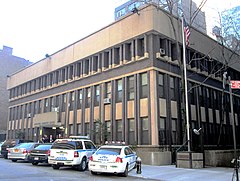
Midtown Manhattan is patrolled by two precincts of the NYPD.[103] Midtown North is patrolled by the 18th Precinct,[a] located at 306 West 54th Street,[104] while Midtown South is patrolled by the 14th Precinct,[a] located at 357 West 35th Street.[106] The precincts ranked 69th safest out of 69 patrol areas for per-capita crime in 2010. The high per-capita crime rate can be attributed to the low population of the area, as well as the high number of crimes committed against tourists.[107] As of 2018[update], with a non-fatal assault rate of 25 per 100,000 people, Midtown Manhattan's rate of violent crimes per capita is less than that of the city as a whole. The incarceration rate of 297 per 100,000 people is lower than that of the city as a whole.[99]: 8
The 18th Precinct has a lower crime rate than it did in the 1990s, with crimes across all categories having decreased by 82.1% between 1990 and 2022. The precinct reported 1 murder, 22 rapes, 154 robberies, 185 felony assaults, 205 burglaries, 2,065 grand larcenies, and 116 grand larcenies auto in 2022.[108] The 14th Precinct also has a lower crime rate than in the 1990s, with crimes across all categories having decreased by 81.2% between 1990 and 2022. The precinct reported 8 murders, 23 rapes, 653 robberies, 502 felony assaults, 660 burglaries, 2,375 grand larcenies, and 68 grand larcenies auto in 2022.[109]
Fire safety
[edit]
The main part of midtown Manhattan, between 34th and 59th Streets from Lexington Avenue to Eighth Avenue, is served by five fire stations of the New York City Fire Department (FDNY):[110]
- Engine Company 1/Ladder Company 24 – 215 West 38th Street[111]
- Engine Company 23 – 215 West 58th Street[112]
- Engine Company 26 – 222 West 37th Street[113]
- Engine Company 54/Ladder Company 4/Battalion 9 – 782 8th Avenue[114]
- Engine Company 65 – 33 West 43rd Street[115]
The greater Midtown area between 14th Street and 59th Street contains seven additional fire stations.[110]
Health
[edit]As of 2018[update], preterm births and births to teenage mothers in Midtown Manhattan are lower than the city average. In Midtown Manhattan, there were 67 preterm births per 1,000 live births (compared to 87 per 1,000 citywide), and 4 births to teenage mothers per 1,000 live births (compared to 19.3 per 1,000 citywide).[99]: 11 Midtown Manhattan has a low population of residents who are uninsured. In 2018, this population of uninsured residents was estimated to be 11%, slightly less than the citywide rate of 12%.[99]: 14
The concentration of fine particulate matter, the deadliest type of air pollutant, in Midtown Manhattan is 0.0113 milligrams per cubic metre (1.13×10−8 oz/cu ft), more than the city average.[99]: 9 Eleven percent of Midtown Manhattan residents are smokers, which is less than the city average of 14% of residents being smokers.[99]: 13 In Midtown Manhattan, 10% of residents are obese, 5% are diabetic, and 18% have high blood pressure—compared to the citywide averages of 24%, 11%, and 28% respectively.[99]: 16 In addition, 9% of children are obese, compared to the citywide average of 20%.[99]: 12
Ninety-one percent of residents eat some fruits and vegetables every day, which is higher than the city's average of 87%. In 2018, 86% of residents described their health as "good", "very good", or "excellent", more than the city's average of 78%.[99]: 13 For every supermarket in Midtown Manhattan, there are 11 bodegas.[99]: 10
The nearest major hospitals are Mount Sinai West in Hell's Kitchen; Beth Israel Medical Center in Stuyvesant Town; the Bellevue Hospital Center and NYU Langone Medical Center in Kips Bay; and NewYork–Presbyterian Hospital in the Upper East Side.[116][117]
Post offices and ZIP Codes
[edit]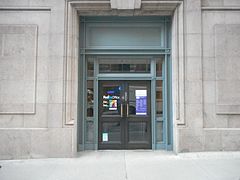
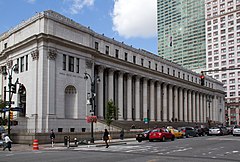
Midtown Manhattan is located within six primary ZIP Codes. West of Fifth Avenue, Midtown is located in 10018 between 34th and 41st Streets, 10036 between 41st and 48th Streets, and 10019 between 48th and 59th Streets. East of Fifth Avenue, Midtown is located in 10016 between 34th and 40th Streets, 10017 between 40th and 49th Streets, and 10022 between 49th and 59th Streets. The area southwest of Fifth Avenue and 34th Street, sometimes considered to be in Midtown, is part of 10001. Other areas between 14th and 34th Streets are covered by ZIP Codes 10003, 10009, 10010, and 10011, though these are generally not considered to be part of Midtown proper.[118] There are also thirty-three ZIP Codes assigned to individual buildings or building complexes.[120]
The United States Postal Service operates six post offices in Midtown:
- Appraisers Stores Station – 580 Fifth Avenue[121]
- Bryant Station – 23 West 43rd Street[122]
- Grand Central Station – 450 Lexington Avenue[123]
- Midtown Station – 223 West 38th Street[124]
- Murray Hill Station – 115 East 34th Street[125]
- Rockefeller Center Station – 610 Fifth Avenue[126]
The James A. Farley Station, the city's main post office, is located at 421 8th Avenue.[127] The post office stopped 24-hour service in 2009 due to decreasing mail traffic.[128]
Education
[edit]Midtown Manhattan generally has a higher rate of college-educated residents than the rest of the city as of 2018[update]. A majority of residents age 25 and older (78%) have a college education or higher, while 6% have less than a high school education and 17% are high school graduates or have some college education. By contrast, 64% of Manhattan residents and 43% of city residents have a college education or higher.[99]: 6 The percentage of Midtown Manhattan students excelling in math rose from 61% in 2000 to 80% in 2011 and reading achievement increased from 66% to 68% during the same time period.[129]
Midtown Manhattan's rate of elementary school student absenteeism is lower than the rest of New York City. In Midtown Manhattan, 19% of elementary school students missed twenty or more days per school year, less than the citywide average of 20%.[100]: 24 (PDF p. 55) [99]: 6 Additionally, 92% of high school students in Midtown Manhattan graduate on time, more than the citywide average of 75%.[99]: 6
Schools
[edit]There are no public elementary or middle schools in Midtown.[130]
The New York City Department of Education operates the following public high schools in Midtown, serving grades 9–12:[130]
- Jacqueline Kennedy-Onassis High School[131]
- Landmark High School[132]
- Murray Hill Academy[133]
- Repertory Company High School for Theatre Arts[134]
- Satellite Academy High School[135]
Private schools include The Beekman School, Rebecca School, and a number of private languages and music centers (e.g. Berlitz, American Language Communication Center, New York Language Center,[136] Swan Music School, and the New York Youth Symphony). The La Scuola d'Italia Guglielmo Marconi Italian international school moved to West Midtown in 2016.[137]
Libraries
[edit]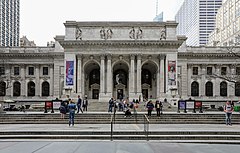
The New York Public Library (NYPL) operates the Stephen A. Schwarzman Building (also the Main Branch), a reference branch at 476 Fifth Avenue. The four-story building, constructed in 1911, is known worldwide for its architecture and has several million items in its collections.[138] There are also five circulating branches in Midtown:[139][140]
- The 53rd Street branch is located at 18 West 53rd Street. The three-level branch opened in 2016,[141] replacing the former Donnell Library Center that had been open from 1955 to 2008.[142]
- The 58th Street branch is located at 127 East 58th Street. The branch opened in a Carnegie library building in 1907 and moved to its current two-story space in 1969.[143]
- The Grand Central branch is located at 135 East 46th Street. The two-story library opened in 2008.[144]
- The Stavros Niarchos Foundation Library (or Mid-Manhattan library) at 455 Fifth Avenue re-opened in its current form in 2021 after renovations.[145] Diagonally opposite the Main Branch, it has occupied this site in various forms since 1970.[146]
- The Terence Cardinal Cooke-Cathedral branch is located in the basement of 560 Lexington Avenue, adjacent to the 51st Street subway station. It opened in 1887 and is the second-smallest branch of the NYPL system.[147]
Higher education
[edit]Two campuses of the City University of New York (CUNY)—the doctorate-granting CUNY Graduate Center and the Stella and Charles Guttman Community College—are located in Midtown, while Baruch College, also of the City University of New York, is located in Midtown South. Mercy College is situated at Herald Square.
Transportation
[edit]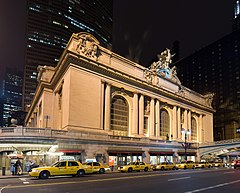
Pennsylvania Station and Grand Central Terminal are the two major railroad stations located in Midtown Manhattan. Penn Station serves Amtrak, NJ Transit, and the Long Island Rail Road (LIRR), while Grand Central serves the Metro-North Railroad and also serves the LIRR at Grand Central Madison.[148] Penn Station is considered to be the busiest transportation hub in the Western Hemisphere, servicing around 650,000 people per day.[149][150]
The Port Authority Bus Terminal, located at Eighth Avenue and 41st Street at the western edge of Midtown, is the city's main intercity bus terminal and the world's busiest bus station, serving 250,000 passengers on 7,000 buses each workday. The building opened in 1950 and had been designed to accommodate 60,000 daily passengers. A 2021 plan announced by the Port Authority would spend $10 billion to expand capacity and modernize the facility.[151][152][153]
The New York City Subway and MTA Regional Bus Operations each operate several routes that go through Midtown. Additionally, the PATH train to New Jersey terminates at 33rd Street and Sixth Avenue in Midtown.[154][155]
Traffic congestion is common, especially for crosstown traffic. In 2011, a new system of traffic light control, known as "Midtown in Motion" was announced, with the aim of reducing traffic congestion.[156] Approximately 750,000 vehicles enter Midtown Manhattan on a fall business day.[157] According to the 2011 Traffic Data Report for New York State, 777,527 vehicles a day went through select toll facilities into Manhattan.[158]
Government infrastructure
[edit]The New York Supreme Court, Appellate Division, First Department, is located at the Appellate Division Courthouse at 25th Street and Madison Avenue was completed in 1900 by architect James Brown Lord, who used a third of the construction budget to decorate the building with statues and murals.[159] The Puerto Rico Federal Affairs Administration operates its New York office on the 22nd floor at 135 West 50th Street.[160]
Diplomatic missions
[edit]Several countries, including Algeria,[161] Argentina, The Bahamas,[162] China,[163] Costa Rica,[164] Germany,[165] Ireland,[166] Israel,[167] Jamaica,[168] Japan,[169] Luxembourg,[170] Mexico,[171] Morocco,[172] Saudi Arabia,[173] Singapore,[174] South Africa,[175] South Korea,[176] United Kingdom,[177] and Ukraine,[178] have Permanent Missions accredited to the United Nations, and consulates-general accredited to the United States, in Midtown Manhattan. In addition, the Taipei Economic and Cultural Office of the Republic of China (Taiwan) is in Midtown Manhattan.[179]
See also
[edit]- East Side (Manhattan)
- History of Manhattan
- History of New York City
- Lower Manhattan
- Manhattanhenge
- Upper Manhattan
- West Side (Manhattan)
References
[edit]Notes
[edit]Citations
[edit]- ^ "Google Map of Midtown Manhattan". Midtown Manhattan. Archived from the original on April 5, 2023. Retrieved April 17, 2024.
- ^ a b c "NYC Planning". communityprofiles.planning.nyc.gov. New York: Department of City Planning. Archived from the original on November 10, 2021. Retrieved March 18, 2019.
- ^ a b Table PL-P3A NTA: Total Population by Mutually Exclusive Race and Hispanic Origin - New York City Neighborhood Tabulation Areas*, 2010 Archived June 10, 2016, at the Wayback Machine, Population Division - New York City Department of City Planning, March 29, 2011. Accessed June 14, 2016.
- ^ Michael Kimmelman (September 30, 2016). "Penn Station Reborn". The New York Times. Archived from the original on September 30, 2016. Retrieved August 3, 2022.
- ^ Employment Density in International Central Business Districts Ranked by Density, Demographia, updated July 29, 2000. Accessed April 17, 2024.
- ^ a b "New York's Fifth Avenue Retains its Top Ranking as the World's Most Expensive Retail Destination". Cushman & Wakefield. November 20, 2023. Archived from the original on August 1, 2024. Retrieved August 1, 2024.
- ^ "The Global Financial Centres Index 33" (PDF). Long Finance. March 23, 2023. Archived (PDF) from the original on June 9, 2023. Retrieved March 24, 2023.
- ^ Remnick, Noah; Schlossberg, Tatiana (August 24, 2015). "New York Today: Transforming Times Square". The New York Times. Archived from the original on August 24, 2015. Retrieved January 10, 2017.
- ^ "Times Square – The Official Site of Times Square". Times Square District Management Association, Inc. Archived from the original on January 18, 2017. Retrieved January 10, 2017.
- ^ "Times Square". Encyclopædia Britannica. Archived from the original on May 17, 2011. Retrieved January 10, 2017.
- ^ Pramis, Joshua (October 2011). "World's Most-Visited Tourist Attractions No. 1: Times Square, New York City". American Express Publishing Corporation. Archived from the original on February 1, 2015. Retrieved January 10, 2017.
- ^ "The Most Jivin' Streetscapes in the World". Luigi Di Serio. 2010. Archived from the original on September 21, 2014. Retrieved January 10, 2017.
- ^ "New York Architecture Images- Midtown Times Square". 2011 nyc-architecture. Archived from the original on January 25, 2017. Retrieved January 10, 2017.
- ^ a b Sclar, Elliot. "midtown" in Jackson, Kenneth T., ed. (1995). The Encyclopedia of New York City. New Haven: Yale University Press. ISBN 0300055366., p. 839
- ^ "Manhattan core public parking study" (PDF). Archived from the original (PDF) on March 4, 2016. Retrieved September 13, 2018.
- ^ [1] Archived May 8, 2013, at the Wayback Machine
- ^ "Q3 2018 U.S. Office Market Outlook - Download research report". Colliers International. December 6, 2018. Archived from the original on April 14, 2019. Retrieved April 13, 2019.
- ^ "Contact Archived July 20, 2012, at archive.today." 4Kids Entertainment. Retrieved on October 13, 2009.
- ^ "National Sponsorships and Donations Archived January 21, 2016, at the Wayback Machine." Barnes & Noble. Retrieved on January 29, 2010.
- ^ "Dreier’s Luxe Life Revealed in $10 Million Auction Archived November 1, 2015, at the Wayback Machine." Retrieved on May 22, 2011
- ^ "5 Times Square – Ernst & Young National Headquarters" Archived October 28, 2011, at the Wayback Machine, Wired New York. Retrieved July 13, 2013
- ^ "Corporate Archived July 23, 2008, at the Wayback Machine." Calvin Klein. Retrieved on January 26, 2010.
- ^ "Locations Archived May 9, 2017, at the Wayback Machine." Cantor Fitzgerald. Retrieved on October 4, 2009.
- ^ a b "Contact Info Archived November 29, 2009, at the Wayback Machine." CBS Corporation. Retrieved on November 3, 2009.
- ^ "Citi – United States Archived March 22, 2012, at the Wayback Machine." Retrieved on May 22, 2011
- ^ "Legal/Privacy Archived February 6, 2016, at the Wayback Machine." Colgate-Palmolive. Retrieved on June 26, 2010.
- ^ "Global locations Archived May 12, 2013, at the Wayback Machine." Cushman & Wakefield. Retrieved on November 12, 2009.
- ^ "More Privacy Information Archived August 20, 2010, at the Wayback Machine." DC Comics. Retrieved on August 28, 2009.
- ^ "Contact Us Archived October 17, 2013, at the Wayback Machine." Deloitte. Retrieved on December 7, 2009.
- ^ "address.gif Archived December 8, 2010, at the Wayback Machine." Duane Reade. Retrieved on December 22, 2010. "Duane Reade Inc. 440 Ninth Ave New York, NY 10001."
- ^ "Corporate Information Archived February 23, 2010, at the Wayback Machine." Estée Lauder Companies. Retrieved on February 29, 2010.
- ^ "Foot Locker, Inc. Archived July 21, 2023, at the Wayback Machine" Foot Locker. Retrieved on January 22, 2010.
- ^ "About Archived February 7, 2009, at the Wayback Machine." Frederator Studios. Retrieved on April 9, 2010.
- ^ "Contact Us Archived June 15, 2011, at the Wayback Machine." Retrieved on May 22, 2011
- ^ "Contact Hess Archived February 27, 2009, at the Wayback Machine." Hess Corporation. Retrieved on February 9, 2009.
- ^ "Office Locations Archived August 10, 2011, at the Wayback Machine." Kroll Inc. Retrieved on August 14, 2011. "Kroll Corporate Headquarters 600 Third Avenue New York, New York 10016 United States"
- ^ "Company Profile Archived June 24, 2011, at the Wayback Machine." L-3 Communications. Retrieved on March 10, 2010.
- ^ "Contact Us Archived July 2, 2014, at the Wayback Machine." Marsh & McLennan Companies. Retrieved on October 4, 2009.
- ^ "Company and Contact Info Archived September 5, 2009, at the Wayback Machine." Marvel Entertainment. Retrieved on August 28, 2009.
- ^ Ramirez, Anthony. "MetLife Sells 2nd Building, A Landmark On Park Ave. Archived February 3, 2015, at the Wayback Machine" The New York Times. April 2, 2005. Retrieved on August 25, 2009.
- ^ "Contact Archived August 30, 2023, at the Wayback Machine." MidOcean Partners. Retrieved on March 5, 2010.
- ^ "Contact Us Archived February 8, 2010, at the Wayback Machine." Morgan Stanley. Retrieved on August 28, 2009.
- ^ "Contact Us Archived January 11, 2022, at the Wayback Machine." Nasdaq, Inc. Retrieved on January 10, 2021.
- ^ "NBC Universal to sell Burbank, Calif, studio Archived June 8, 2011, at the Wayback Machine." MarketWatch. Retrieved on August 28, 2009.
- ^ "Contact Us Archived May 6, 2009, at the Wayback Machine." The New York Times Company. Retrieved on August 28, 2009.
- ^ "NexCen Homepage Archived July 20, 2023, at the Wayback Machine." NexCen Brands. Retrieved on February 26, 2010.
- ^ Contact, Viacom. Retrieved on August 28, 2009. Archived August 30, 2009, at the Wayback Machine
- ^ "Contact Us Archived September 21, 2023, at the Wayback Machine." Pfizer. Retrieved on April 3, 2010.
- ^ "Contact Us Archived October 18, 2015, at the Wayback Machine." Ralph Lauren Investor Relations. Retrieved on January 27, 2010.
- ^ "Corporate Addresses Archived October 18, 2005, at the Wayback Machine." Saks Incorporated. Retrieved on March 1, 2010.
- ^ "About Us Archived October 13, 2010, at the Wayback Machine." The Sharper Image. Retrieved on February 18, 2010.
- ^ "Contact Us Archived September 20, 2010, at the Wayback Machine." Six Flags. Retrieved on May 6, 2009.
- ^ "Contact Us Archived July 22, 2010, at the Wayback Machine." TBWA Worldwide. Retrieved on July 8, 2010. "488 Madison Avenue, New York, New York 10022 United States"
- ^ "About Us Archived January 1, 2011, at the Wayback Machine." Thomson Reuters. Retrieved on August 28, 2009.
- ^ "AOL Time Warner's Future Home Is Damaged by Fire; The morning blaze at the building under construction in New York spread to parts of four floors. The cause is under investigation." Los Angeles Times. April 9, 2003. Business C3. Retrieved on August 28, 2009.
- ^ "Investor Relations Contact Us Archived April 1, 2010, at the Wayback Machine." Time Warner Cable. Retrieved on March 6, 2010.
- ^ "Contact Archived August 16, 2011, at the Wayback Machine." Univision. Retrieved on August 28, 2011. "605 Third Avenue, 12th Floor New York, NY 10158"
- ^ "Contact Us Archived January 4, 2010, at the Wayback Machine." New York Institute of Finance. Retrieved on October 4, 2009.
- ^ "Haier Building Archived February 13, 2009, at the Wayback Machine." Haier. Retrieved on January 26, 2009.
- ^ "Office Network Archived February 1, 2009, at the Wayback Machine." Sumitomo Corporation. Retrieved on January 25, 2009.
- ^ "Worldwide Offices USA Archived July 30, 2012, at archive.today." El Al. Retrieved on September 29, 2009.
- ^ "Air France in the United States Archived January 6, 2011, at the Wayback Machine." Air France. June 11, 2007. 15 (15/16). Retrieved on February 13, 2010. "The Air France "United States" regional management is located in New York: 125 West 55th Street, New York, NY 10019 Tel: (212) 830–4000."
- ^ "Welcome to Air France career opportunities Archived March 15, 2014, at the Wayback Machine." Air France USA. Retrieved on February 13, 2010.
- ^ "FAQs Archived April 11, 2011, at the Wayback Machine." Machette Book Group. Retrieved on April 17, 2011. "Hachette Book Group Marketing Department 237 Park Avenue New York, NY 10017"
- ^ "Alitalia stays in Midtown through creative deal Archived January 19, 2012, at the Wayback Machine." Real Estate Weekly. December 14, 1994. Retrieved on June 15, 2010.
- ^ "Contact Us Archived February 18, 2010, at the Wayback Machine." Global Infrastructure Partners. Retrieved on February 27, 2010.
- ^ Casselman, Ben; Collins, Keith; Russell, Karl (February 15, 2019). "Even Without Amazon, Tech Could Keep Gaining Ground in New York". The New York Times. Archived from the original on February 15, 2019. Retrieved February 16, 2019.
- ^ Morris, Keiko (July 28, 2014). "Wanted: Biotech Startups in New York City: The Alexandria Center for Life Science Looks to Expand". The Wall Street Journal. Archived from the original on August 1, 2014. Retrieved August 1, 2014.
- ^ "Department of Finance Publishes Fiscal Year 2015 Tentative Assessment Roll" (PDF). New York City Department of Finance. January 15, 2014. Archived from the original (PDF) on February 2, 2014. Retrieved January 23, 2014.
- ^ McTiernan, Andy (2008). "A quantum leap for capital assets". The Free Library By Farlex. Archived from the original on September 4, 2015. Retrieved October 16, 2014.
- ^ Frank, Robert (October 6, 2014). "Waldorf becomes most expensive hotel ever sold: $1.95 billion". CNBC. Archived from the original on June 26, 2015. Retrieved October 9, 2014.
- ^ Reed, Bruce Cameron (2020). Manhattan Project : The Story of the Century (1 ed.). Springer International Publishing AG. ISBN 9783030457341.
- ^ Quirk, James. "Bergen offices have plenty of space". Archived from the original on December 22, 2007., The Record (Bergen County), July 5, 2007. Accessed July 5, 2007.
- ^ Erin Carlyle (October 8, 2014). "New York Dominates 2014 List of America's Most Expensive ZIP Codes". Forbes. Archived from the original on April 26, 2020. Retrieved October 9, 2014.
- ^ "Hedge Fund Billionaire Ken Griffin Buys America's Most Expensive Home". www.bloomberg.com. January 29, 2019. Archived from the original on December 19, 2019. Retrieved February 16, 2019.
- ^ Emily Nonko (April 1, 2022). "Office-to-Residential Conversion Zoning Proposal for Midtown". EQ Media, LLC. Archived from the original on September 24, 2022. Retrieved September 24, 2022.
- ^ "Mayor Adams, DCP Director Garodnick Unveil Proposal to Convert Vacant Offices to Housing Through City Action, Outline Next Step in 'City of Yes' Plan" Archived December 28, 2023, at the Wayback Machine, City of New York, August 17, 2023. Accessed December 28, 2023. "Finally, the Adams administration today kicked off the “Midtown South Neighborhood Plan,” a community planning process that will update zoning rules that currently allow only manufacturing and office space to foster a vibrant, 24/7 live-work community with new homes and good job opportunities.... With the proposed changes — which Mayor Adams first outlined in partnership with the City Council in January 2023 and highlighted again in March and May — office-to-residential conversions could produce 20,000 new homes for 40,000 New Yorkers in the next decade.... Launching today, the Midtown South Mixed-Use Neighborhood Plan will update outdated zoning to foster a 24/7, live-work, mixed-use neighborhood in the area between 23rd Street and 40th Street from Fifth Avenue to Eighth Avenue."
- ^ Zaveri, Mihir (August 17, 2023). "New York Plans to Convert Parts of Midtown Manhattan to Housing". The New York Times. ISSN 0362-4331. Archived from the original on December 28, 2023. Retrieved December 28, 2023.
- ^ "Broadway Season Statistics". The Broadway League. Archived from the original on July 27, 2024. Retrieved August 3, 2024.
- ^ World Airline Directory. Flight International. March 20, 1975. "472 Archived December 3, 2010, at the Wayback Machine.
- ^ Sterba, James P. "American Will Shift Headquarters From Manhattan to Dallas Airport; Big Economies Predicted Archived April 30, 2018, at the Wayback Machine." The New York Times. Thursday November 16, 1978. Page A1. Retrieved on August 27, 2009.
- ^ Senate Committee on the Judiciary. Juvenile Delinquency: Comic Books. Motion Pictures. Obscene and Pornographic Materials. Television Programs. Greenwood Press, 1969. 47. Retrieved on January 25, 2011. "American Comics Group, 45 West 45th Street, New York, NY"
- ^ Rice, Diana. "News notes from the field of travel; Cape Cod air service tours to Spain for honeymooners Vermont music camp currency guide trail riders ride again Griswold's country club here and there Archived March 3, 2014, at the Wayback Machine." The New York Times. April 30, 1950. Drama-Music, Fashion-Screen, Page X17. Retrieved on August 25, 2009. "American and American Overseas Airlines executive offices have moved from 100 East Forty-second Street to 100 Park Avenue"
- ^ "Contact Us". Archived from the original on March 12, 2007. Retrieved May 24, 2017.. Central Park Media. March 12, 2007. Retrieved on September 14, 2009.
- ^ "250 West 57th Street Archived August 28, 2008, at the Wayback Machine." W&H Properties. Retrieved on September 14, 2009.
- ^ Bernstein, Aaron. Grounded: Frank Lorenzo and the Destruction of Eastern Airlines. Beard Books, 1999. 22. Retrieved on August 28, 2009.
- ^ "Company Information". GoodTimes Entertainment. June 17, 2000. Archived from the original on June 17, 2000.
- ^ Johnson, Doris McNeely. "Children's Toys and Books: Choosing the Best for All Ages from Infancy to Adolescence." Scribner, 1982. Unknown page. Retrieved from Google Books on July 8, 2010. ISBN 0-684-17767-6, ISBN 978-0-684-17767-0. "LJN Toys, Inc. 200 Fifth Ave. New York, NY 10010."
- ^ "Corporate Directory". Archived from the original on January 4, 2002. Retrieved July 28, 2010.. NewKidCo. January 4, 2002. Retrieved on July 27, 2010.
- ^ Dunlap, David W. "Final Pan Am Departure Archived December 11, 2020, at the Wayback Machine." The New York Times. Friday September 4, 1992. Retrieved on August 25, 2009.
- ^ "Contact Us". Archived from the original on April 9, 2001. Retrieved April 9, 2001.. Philip Morris Companies. April 9, 2001. Retrieved on October 19, 2009.
- ^ "Philip Morris to Move Headquarters from New York City to Richmond, Va. Archived May 25, 2012, at archive.today." New York Daily News. March 5, 2003. Retrieved on October 19, 2009.
- ^ "World Airline Directory." Flight International. March 26, 1970. "Trans Caribbean" 504 Archived December 3, 2010, at the Wayback Machine.
- ^ World Airline Directory. Flight International. March 20, 1975. "508.
- ^ "Map Archived May 24, 2015, at the Wayback Machine." Turtle Bay Association. Retrieved on January 25, 2009.
- ^ Brown, Betsy (July 19, 1987). "Mount Kisco Awaits Arrival of T.W.A." The New York Times. Retrieved January 5, 2009.
- ^ Wax, Alan J. "Aer Lingus moving offices to LI Archived March 26, 2013, at the Wayback Machine." Newsday. April 10, 1997. A61.
- ^ Table PL-P5 NTA: Total Population and Persons Per Acre - New York City Neighborhood Tabulation Areas*, 2010 Archived June 10, 2016, at the Wayback Machine, Population Division - New York City Department of City Planning, February 2012. Accessed June 16, 2016.
- ^ a b c d e f g h i j k l m n o "Midtown (Including Flatiron, Herald Square, Midtown, Midtown South, Times Square and Union Square)" (PDF). nyc.gov. NYC Health. 2018. Archived (PDF) from the original on March 23, 2019. Retrieved March 2, 2019.
- ^ a b "2016-2018 Community Health Assessment and Community Health Improvement Plan: Take Care New York 2020" (PDF). nyc.gov. New York City Department of Health and Mental Hygiene. 2016. Archived (PDF) from the original on September 9, 2017. Retrieved September 8, 2017.
- ^ Short, Aaron (June 4, 2017). "New Yorkers are living longer, happier and healthier lives". New York Post. Archived from the original on March 2, 2019. Retrieved March 1, 2019.
- ^ "NYC-Manhattan Community District 4 & 5--Chelsea, Clinton & Midtown Business District PUMA, NY". Archived from the original on March 23, 2019. Retrieved July 17, 2018.
- ^ "Find Your Precinct and Sector - NYPD". www.nyc.gov. Archived from the original on March 4, 2021. Retrieved March 3, 2019.
- ^ "NYPD – 18th Precinct". www.nyc.gov. New York City Police Department. Archived from the original on May 20, 2017. Retrieved October 3, 2016.
- ^ Gorce, Tammy La (March 17, 2017). "New York Has 77 Police Precincts. Why Do Their Numbers Go Higher?". The New York Times. ISSN 0362-4331. Archived from the original on September 4, 2019. Retrieved September 4, 2019.
- ^ "NYPD – 14th Precinct". www.nyc.gov. New York City Police Department. Archived from the original on May 23, 2017. Retrieved October 3, 2016.
- ^ "Midtown Manhattan – DNAinfo.com Crime and Safety Report". www.dnainfo.com. Archived from the original on April 15, 2017. Retrieved October 6, 2016.
- ^ "18th Precinct CompStat Report" (PDF). www.nyc.gov. New York City Police Department. Archived (PDF) from the original on March 28, 2018. Retrieved July 22, 2018.
- ^ "14th Precinct CompStat Report" (PDF). www.nyc.gov. New York City Police Department. Archived (PDF) from the original on April 13, 2018. Retrieved July 22, 2018.
- ^ a b "FDNY Firehouse Listing – Location of Firehouses and companies". NYC Open Data; Socrata. New York City Fire Department. September 10, 2018. Retrieved March 14, 2019.
- ^ "Engine Company 1/Ladder Company 24". FDNYtrucks.com. Archived from the original on October 23, 2018. Retrieved March 14, 2019.
- ^ "Engine Company 23". FDNYtrucks.com. Archived from the original on October 20, 2018. Retrieved March 14, 2019.
- ^ "Engine Company 26". FDNYtrucks.com. Archived from the original on October 20, 2018. Retrieved March 14, 2019.
- ^ "Engine Company 54/Ladder Company 4/Battalion 9". FDNYtrucks.com. Archived from the original on October 20, 2018. Retrieved March 14, 2019.
- ^ "Engine Company 65". FDNYtrucks.com. Archived from the original on December 22, 2018. Retrieved March 14, 2019.
- ^ "Manhattan Hospital Listings". New York Hospitals. Archived from the original on November 15, 2016. Retrieved March 20, 2019.
- ^ "Best Hospitals in New York, N.Y." U.S. News & World Report. July 26, 2011. Archived from the original on May 29, 2019. Retrieved March 20, 2019.
- ^ a b "Midtown, New York City-Manhattan, New York Zip Code Boundary Map (NY)". United States Zip Code Boundary Map (USA). Archived from the original on August 3, 2020. Retrieved March 23, 2019.
- ^ "Why do some buildings have their own ZIP Codes?". am New York. March 18, 2019. Archived from the original on March 23, 2019. Retrieved March 23, 2019.
- ^ These ZIP Codes are:[118][119]
- 10020 (Rockefeller Center)
- 10055 (Park Avenue Plaza)
- 10103–10107 (respectively 666 Fifth Avenue, 1290 Avenue of the Americas, 1345 Avenue of the Americas, 888 Seventh Avenue, 250 West 57th Street)
- 10110–10112 (respectively 500 Fifth Avenue, 45 Rockefeller Plaza, 30 Rockefeller Plaza)
- 10118–10119 (respectively Empire State Building, One Penn Plaza)
- 10120–10122 (respectively 112 West 34th Street, 2 Penn Plaza, 225 West 34th Street)
- 10151–10155 (respectively 745 Fifth Avenue, Seagram Building, General Motors Building, 345 Park Avenue, 964 Third Avenue)
- 10165–10169 (respectively One Grand Central Place, MetLife Building, 245 Park Avenue, Chanin Building, Helmsley Building)
- 10170–10177 (respectively 420 Lexington Avenue, 299 Park Avenue, 277 Park Avenue, 355 Madison Avenue, Chrysler Building, 521 Fifth Avenue, 551 Fifth Avenue, 250 Park Avenue)
- ^ "Location Details: Appraisers Stores". USPS.com. Archived from the original on December 31, 2023. Retrieved March 7, 2019.
- ^ "Location Details: Bryant". USPS.com. Archived from the original on December 31, 2023. Retrieved March 7, 2019.
- ^ "Location Details: Grand Central". USPS.com. Archived from the original on December 31, 2023. Retrieved March 7, 2019.
- ^ "Location Details: Midtown". USPS.com. Archived from the original on April 8, 2023. Retrieved March 7, 2019.
- ^ "Location Details: Murray Hill". USPS.com. Archived from the original on September 15, 2022. Retrieved March 7, 2019.
- ^ "Location Details: Rockefeller Center". USPS.com. Archived from the original on December 31, 2023. Retrieved March 7, 2019.
- ^ "Location Details: James A Farley". United States Postal Service. Archived from the original on March 7, 2022. Retrieved March 7, 2019.
- ^ "New York City's main post office stops 24-hour service Archived May 18, 2010, at the Wayback Machine." Associated Press. Friday April 17, 2009. Retrieved on May 5, 2009.
- ^ "Midtown – MN 05" (PDF). Furman Center for Real Estate and Urban Policy. 2011. Archived (PDF) from the original on April 12, 2019. Retrieved October 5, 2016.
- ^ a b "Midtown New York School Ratings and Reviews". Zillow. Archived from the original on March 23, 2019. Retrieved March 17, 2019.
- ^ "Jacqueline Kennedy Onassis High School". New York City Department of Education. December 19, 2018. Archived from the original on August 4, 2020. Retrieved March 23, 2019.
- ^ "Landmark High School". New York City Department of Education. December 19, 2018. Archived from the original on March 23, 2019. Retrieved March 23, 2019.
- ^ "Murray Hill Academy". New York City Department of Education. December 19, 2018. Archived from the original on March 23, 2019. Retrieved March 23, 2019.
- ^ "Repertory Company High School for Theatre Arts". New York City Department of Education. December 19, 2018. Archived from the original on March 23, 2019. Retrieved March 23, 2019.
- ^ "Satellite Academy High School". New York City Department of Education. December 19, 2018. Archived from the original on March 23, 2019. Retrieved March 23, 2019.
- ^ "Manhattan – Midtown". New York Language Center. Archived from the original on November 4, 2013. Retrieved November 13, 2013.
- ^ Clarke, Catherine. "Italian private school drops $55M on new NYC cultural and education center " (Archive). New York Daily News. September 11, 2015. Retrieved on February 25, 2016.
- ^ "About the Stephen A. Schwarzman Building". New York Public Library. Archived from the original on December 31, 2023. Retrieved March 23, 2019.
- ^ a b "NYPL Locations". New York Public Library. Archived from the original on March 21, 2019. Retrieved March 23, 2019.
- ^ This does not include five additional branches located between 14th and 59th Streets but are not part of Midtown proper. These are the Columbus, Epiphany, Kips Bay, and Muhlenberg branches and the Heiskell Braille and Talking Book Library.[139]
- ^ "About the 53rd Street Library". New York Public Library. Archived from the original on March 23, 2019. Retrieved March 23, 2019.
- ^ "Donnell Library Center". New York Public Library. Archived from the original on March 23, 2019. Retrieved March 23, 2019.
- ^ "About the 58th Street Library". New York Public Library. May 10, 1907. Archived from the original on March 23, 2019. Retrieved March 23, 2019.
- ^ "About the Grand Central Library". New York Public Library. Archived from the original on March 23, 2019. Retrieved March 23, 2019.
- ^ Hickman, Matt (June 1, 2021). "The Stavros Niarchos Foundation Library reopens in Midtown Manhattan". The Architect’s Newspaper. Archived from the original on September 4, 2021. Retrieved August 29, 2023.
- ^ Campbell, Barbara (October 21, 1970). "Dream of Library Realized". The New York Times. ISSN 0362-4331. Archived from the original on August 19, 2020. Retrieved August 29, 2023.
- ^ "About Terence Cardinal Cooke-Cathedral Library". New York Public Library. Archived from the original on March 23, 2019. Retrieved March 23, 2019.
- ^ Castillo, Alfonso A. (January 24, 2023). "LIRR Grand Central Madison service to begin on Wednesday". Newsday. Archived from the original on January 24, 2023. Retrieved March 25, 2023.
- ^ "The Most Awful Transit Center in America Could Get Unimaginably Worse". Bloomberg News. January 10, 2018. Archived from the original on April 30, 2021. Retrieved October 19, 2018.
- ^ Bankoff, Caroline (November 24, 2013). "More People Pass Through Penn Station Each Day Than Through LaGuardia, JFK, and Newark Airports Combined". Daily Intelligencer. Archived from the original on May 21, 2020.
- ^ Architect Chosen for Planned Office Tower Above Port Authority Bus Terminal's North Wing, Port Authority of New York and New Jersey, dated November 17, 2008. Accessed January 4, 2024. "The Port Authority Bus Terminal opened in 1950 and has become the busiest bus passenger facility in the world, handling 7,000 buses and 200,000 commuters each day. It includes 223 bus gates, retail and commercial space, and public parking for 1,250 vehicles."
- ^ McGeehan, Patrick; and Hu, Winnie. "‘Notorious’ Port Authority Bus Terminal May Get a $10 Billion Overhaul" Archived January 24, 2021, at the Wayback Machine, The New York Times, January 20, 2021, updated September 23, 2021. Accessed January 4, 2024. "The bus terminal plan, which has been in the works for more than seven contentious years, would cost as much as $10 billion and could take a decade to complete.... More than 250,000 people passed through it on a typical weekday before the pandemic, according to the Port Authority.... The bus terminal, a brick hulk perched at the mouth of the Lincoln Tunnel, has long exceeded its capacity — when it opened in late 1950, it was expected to handle 60,000 passengers a day."
- ^ Wilson, Colleen. "Port Authority Bus Terminal was once a marvel. Will the next one meet commuters' needs?" Archived January 4, 2024, at the Wayback Machine, The Record, June 30, 2021. Accessed January 4, 2024. "Becoming the busiest bus terminal in the world doesn't happen without also bearing the brunt of blame every time a commute goes horribly wrong — deserved or otherwise.... The popularity of bus commuting over the Hudson River has steadily risen over the last seven decades, with some 260,000 people a day coming through the terminal pre-pandemic.... A more efficient terminal should improve some of the delays through the Lincoln Tunnel and exclusive bus lane (XBL), the dedicated lane in the morning that converges all buses into a single lane from I-495 into the Lincoln Tunnel from New Jersey."
- ^ "Subway Map" (PDF). Metropolitan Transportation Authority. September 2021. Retrieved September 17, 2021.
- ^ "Manhattan Bus Map" (PDF). Metropolitan Transportation Authority. July 2019. Retrieved December 1, 2020.
- ^ Midtown in Motion traffic system Archived July 22, 2011, at the Wayback Machine NY 1 News, July 19, 2011
- ^ "Archived copy" (PDF). Archived from the original (PDF) on October 29, 2012. Retrieved December 3, 2012.
{{cite web}}: CS1 maint: archived copy as title (link) - ^ "Archived copy" (PDF). Archived from the original (PDF) on September 27, 2013. Retrieved September 22, 2013.
{{cite web}}: CS1 maint: archived copy as title (link) - ^ Manhattan Appellate Courthouse Archived May 5, 2023, at the Wayback Machine, New York City Department of Citywide Administrative Services. Accessed December 31, 2023. "The architect James Brown Lord was given the then unheard of sum of $700,000 to construct the courthouse. Responding to the 'City Beautiful' movement, Lord was instructed to use a large percentage of the construction budget for decoration. Despite spending a third of the total cost on decorative features, like statues and murals, he managed to complete the building under budget by over $60,000."
- ^ "About PRFAA – New York Office" Archived May 23, 2013, at the Wayback Machine, Puerto Rico Federal Affairs Administration. Retrieved on July 18, 20139.
- ^ "Contact Us". Consulate General of Algeria in New York. Archived from the original on August 5, 2023. Retrieved August 5, 2023.
- ^ Consular/Travel information. Archived April 5, 2013, at the Wayback Machine Retrieved on January 26, 2009.
- ^ Home page. Archived January 25, 2009, at the Wayback Machine Retrieved on January 25, 2009.
- ^ Consulates in the United States. Archived January 23, 2009, at the Wayback Machine Retrieved on January 31, 2009.
- ^ Address, Contact, Hours. Archived November 17, 2008, at the Wayback Machine Retrieved on January 26, 2009.
- ^ Ireland in New York. Archived July 19, 2011, at the Wayback Machine Retrieved on January 25, 2009.
- ^ Consular Department. Archived January 21, 2009, at the Wayback Machine Retrieved on January 26, 2009.
- ^ Contact Us. Archived January 31, 2009, at the Wayback Machine Retrieved on January 30, 2009.
- ^ Location/Hours/Contact. Archived July 16, 2019, at the Wayback Machine Retrieved on January 25, 2009.
- ^ Home. Archived December 17, 2008, at the Wayback Machine Retrieved on January 28, 2009.
- ^ Home Page. Archived February 27, 2009, at the Wayback Machine Retrieved on January 25, 2009.
- ^ Home. Archived July 14, 2011, at the Wayback Machine Retrieved on January 25, 2009.
- ^ Ministry addresses in the U.S. Archived January 3, 2009, at the Wayback Machine Retrieved on January 26, 2009.
- ^ Singapore Consulate in New York Mission Homepage. Archived March 29, 2012, at archive.today Retrieved on January 28, 2009.
- ^ Home Page. Archived January 23, 2009, at the Wayback Machine Retrieved on January 26, 2009.
- ^ Consulate General of the Republic of Korea in New York Archived January 28, 2019, at the Wayback Machine. Retrieved on January 28, 2019.
- ^ New York. Archived January 23, 2009, at the Wayback Machine UK in the USA. Retrieved on January 25, 2009.
- ^ Ukrainian Consul, home page Archived January 22, 2009, at the Wayback Machine. Retrieved on January 26, 2009.
- ^ Taiwan Embassy. Archived February 13, 2009, at the Wayback Machine Retrieved on January 25, 2009.
External links
[edit] Media related to Midtown Manhattan at Wikimedia Commons
Media related to Midtown Manhattan at Wikimedia Commons Manhattan/Midtown East travel guide from Wikivoyage
Manhattan/Midtown East travel guide from Wikivoyage
